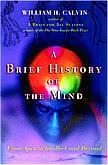|
Brains, climate, and human evolution This is the academic home page. The broader range of material is now consolidated at WilliamCalvin.com (just click here). |
William H.
Calvin
|
|
UNIVERSITY OF WASHINGTON SCHOOL OF MEDICINE William H. Calvin, Ph.D. Vital stats: 2004- Affiliate Professor Emeritus
1998-2004 Affiliate Professor of Psychiatry and Behavioral Sciences,
1978-1979 Visiting Professor of Neurobiology, Hebrew University of Jerusalem
1966- University of Washington faculty (at various
times, Departments of Neurological 1962-1966 University of Washington, Physiology and Biophysics, Ph.D., 1966. 1962 Harvard Medical School, visiting graduate student 1961-1962 MIT, Communications Biophysics Group, Graduate Research Assistant 1957-1960 Northwestern University (B.A. with Honors in Physics, 1961) Honors 1998- Fellow, Association for Psychological Science 2002 Phi Beta Kappa book prize for science as literature
2006
Kistler Book Prize
Elected
member of American Physiological Society*, Biophysical Society*,
International Association for the Study of Pain*, International Brain
Research Organization, Society for Neuroscience, International Society
for Human Ethology, AAAS, IEEE*, American Association of Physical
Anthropologists, International Astronomical Union, American
Psychological Society, American Geophysical Union, Society for American
Archaeology*. [*=former elected member] Books: William H. Calvin (2008). Global Fever: How to Treat Climate Change. University of Chicago Press. William H. Calvin (2005). Almost Us: Portraits of the Apes. Booksurge/Amazon.com. William H. Calvin (2004). A Brief History of the Mind: From Apes to Intellect and Beyond. Oxford University Press.William H. Calvin (2002). A Brain for All Seasons: Human Evolution and Abrupt Climate Change. University of Chicago Press. Phi Beta Kappa book award for science, 2002.William H. Calvin and Derek Bickerton (2000). Lingua ex Machina: Reconciling Darwin and Chomsky with the Human Brain. MIT Press. Research monograph. Spanish translation. William H. Calvin (1996). The Cerebral Code: Thinking a Thought in the Mosaics of the Mind (M.I.T. Press). Research monograph. 1998 paperback. German translation 2000. William H. Calvin (1996). How Brains Think: Evolving Intelligence, Then and Now (Basic Books, part of Science Masters series with 13 translation editions). Book of the Month Club. William H. Calvin and George A. Ojemann (1994). Conversations with Neil's Brain: The Neural Nature of Thought and Language (Addison-Wesley trade book, now Perseus Books). William H. Calvin (1991). How the Shaman Stole the Moon. New York: Bantam. William H. Calvin (1990). The Ascent of Mind: Ice Age Climates and the Evolution of Intelligence. New York: Bantam. William H. Calvin (1989). The Cerebral Symphony: Seashore Reflections on the Structure of Consciousness. New York: Bantam. William H. Calvin (1986). The River That Flows Uphill: A Journey from the Big Bang to the Big Brain. New York: Macmillan. William H. Calvin (1983). The Throwing Madonna: Essays on the Brain. New York: McGraw-Hill. Revised edition by Bantam (July, 1991). Authors Guild reprint edition, 2001. William H. Calvin and George A. Ojemann (1980). Inside the Brain: Mapping the Cortex, Exploring the Neuron. New York: New American Library. A sampling of articles and chapters: Calvin, William H. (2007). Why a creative brain? Evolutionary setups for off-line planning of coherent stages. In: Consciousness and Cognition: Fragments of Mind and Brain, edited by Henri Cohen and Brigitte Stemmer. Elsevier, pp.115-126. Calvin, William H. (2006). Filling the empty niches. In: Intellectuals who quest beyond the ivory tower, edited by Saleem Ali and Robert F. Barsky. AmeriQuests: Vanderbilt University, at http://ejournals.library.vanderbilt.edu/ameriquests/viewissue.php?id=8. Calvin, William H. (2005) , "Konzeptwandel nach dem Kontakt,” chapter for Tobias Daniel Wabbel (ed.), Leben im All (Patmos, Dusseldorf), pp. 127-140. See also http://WilliamCalvin.com/2005/postcontact.htm for the original English, “Concept Change After Contact.” An English remake will appear as "Heavens Above!" in The Edge of Reason: Science and Religion in Modern Society, to be published by Continuum Press in 2008.Calvin, William H. (2004) , "Gott neu erfinden,” chapter for Tobias Daniel Wabbel (ed.), Im Anfang war (k)ein Gott (Patmos, Dusseldorf, 2004), pp. 175-185. See also http://WilliamCalvin.com/2003/reinventing.htm for the original English, “Reinventing God.”"The Fate of the Soul." Natural History (June 2004). "Rediscovery and the cognitive aspects of toolmaking: Lessons from the handaxe." Behavioral and Brain Sciences 25(3):403-404 (2002)." Memory's Future" (with Elizabeth Loftus), Psychology Today 34(2):55ff (March-April, 2001)."Abrupt Climate Jumps and the Evolution of Higher Intellectual Functions during the Ice Ages," chapter for R. J. Sternberg, ed., The Evolution of Intelligence (Erlbaum, 2001), pp. 97-115. "The Emergence of Intelligence," Scientific American Presents 9(4):44-51 (November 1998). The 2006 revision is in a Scientific American special issue. It's also out in audiotape: Human Evolution: Selections from Scientific American Magazine by Stephen Jay Gould, William H. Calvin, Yves Coppens, Ian Tattersall, & Luca Cavalli-Sforza. for The Atlantic Monthly (January 1998)."The Six Essentials? Minimal Requirements for the Darwinian Bootstrapping of Quality," Journal of Memetics 1 (1997). "Cortical Columns, Modules, and Hebbian Cell Assemblies," in: The Handbook of Brain Theory and Neural Networks, edited by Michael A. Arbib (Bradford Books/MIT Press), pp. 269-272 (1995). In Tools, Language, and Cognition in Human Evolution, edited by Kathleen R. Gibson and Tim Ingold. Cambridge University Press, pp. 230-250 (1993).Much more at WilliamCalvin.com.
The Virtual Index for my books and articles, far better than my printed index in most cases:
|
A Brief History of the Mind, 2004 Lingua ex Machina 2000 The Cerebral Code 1996 How Brains Think 1996
|












